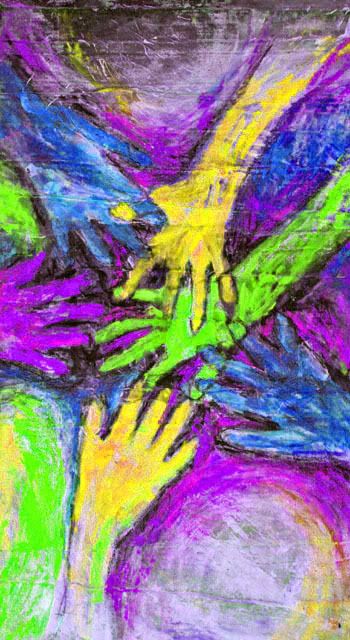
A Sermon for the first Sunday after Christmas
December 31, 2006
by Pastor Laura Gentry
Colossians 3:12-17
As God’s chosen ones, holy and beloved, clothe yourselves with compassion, kindness, humility, meekness, and patience. Bear with one another and, if anyone has a complaint against another, forgive each other; just as the Lord has forgiven you, so you also must forgive. Above all, clothe yourselves with love, which binds everything together in perfect harmony. And let the peace of Christ rule in your hearts, to which indeed you were called in the one body. And be thankful. Let the word of Christ dwell in you richly; teach and admonish one another in all wisdom; and with gratitude in your hearts sing psalms, hymns, and spiritual songs to God. And whatever you do, in word or deed, do everything in the name of the Lord Jesus, giving thanks to God the Father through him. (New Revised Standard Version)
Grace and Peace to you from God our Father and from our Lord and Savior, Jesus Christ.
In our second lesson for today, we hear a portion of a letter that was written to the Christians at Colossae, which was in what is now southwestern Turkey. It had a flourishing wool and textile industry and a significant Jewish population. It seems that most Christians there were Gentile. It was most likely written in Paul’s name, by one of Paul’s disciples. In the ancient world, writing in the name of a respected author was accepted and regarded as an honor.
In this portion of the letter, the author is in the midst of describing the Christian life. He instructs them: “Set your minds on things that are above” In order to be ready for Christ when he comes again, you must strip off the old self. Throw it off—get spiritually naked so that you can put on what is right. You need to cloth yourself with virtuous behaviors instead, so that you can be transformed into God’s image.
Today is New Year’s Eve day! It is the time we think ahead to the coming year. We make resolutions or at least we think that we ought to make resolutions. More than any other time of year, we get serious about how to better ourselves, how to make the coming year count. And so this advice from the book of Colossians is quite helpful in this thought process. How do we better ourselves? We put on the following behaviors, just as you would put on clothes. We've got to get dressed for the new year.
Compassion
Compassion is the first thing we are to clothe ourselves with. Think of the most compassionate people you have known. They have an overflowing sympathy for everyone. They go the distance to connect with others and to help them. What would it take for you to put on an extra cloak of compassion this year?
Kindness
The next thing we are to put on is kindness. To be kind is to be friendly, generous and considerate. Have you seen the bumper stickers that says: “Practice random kindness and senseless acts of beauty”? It is such a good reminder that kindness should be given lavishly, even randomly, because God is so good to us.
Humility & Meekness
The writer says we are also to put on humility and meekness, a gentleness towards others. We are not to go about puffed up as if everyone owes us something. Rather, we are to be so grateful for what we’ve been given that we seek out the good of all.
Patience
And we are to put on patience. Another bumper sticker I get a kick out of says: “Lord, give me patience, and I want it RIGHT NOW!” That about sums it up. Even with God, we seem to have too little patience. Think about the really patient people you know and dwell for a moment on the pleasantness they bring. How lovely it is to be around someone with great patience. Indeed, we need to make sure we put on patience.
Forgiveness
He goes on to say that we need to bear with one another (the patience helps with this) and forgive one another as Christ has forgiven us. He knows that even in Christian communities, we can get on one another’s nerves and feelings get hurt. So we must be as generous with our forgiveness, as Christ has been in forgiving us.
Love
In wrapping up the clothing metaphor, he writes: “Above all, clothe yourselves with love, which binds everything together in perfect harmony.” Love is like the suspenders that hold the whole outfit together. Without love, these other wonderful behaviors have little value. Above all, we must be loving. That is the key to healthy community and healthy relationships. And throughout his life on earth, Jesus modeled this kind of self-giving love for us.
Peace
“And let the peace of Christ rule in your hearts,” the author writes, “And be thankful.” Now this is a lovely phrase, but how can we live it as we move into 2007? How can the peace of Christ rule our hearts? The word translated as “rule” here literally means be umpire or referee: so may “the peace of Christ” be the reference point for our consciences.
Unfortunately, there is too little peace in our world and that’s because there is too little peace in our hearts. I mean, how many of you never worry? How many of you never wake up in the middle of the night and find your brain wracked with concern about some issue? How many of you can say that you fully posses a peace, as I say at the end of each sermon, that passes all understanding?
If we don’t have that kind of surpassing peace, if it is still missing from our lives—and I would venture to guess that includes all of us here—then we need to go after it. In the way that Christmas shoppers go after the gifts on their list, in the way that athletes go after the win, we must seek peace and pursue it because it is ours for the taking. Christ offers it to us. In fact, in Ephesians 2:14, it says that Christ himself is our peace. He offer us his very presence and that brings us peace.
As I thought about the message of this powerful letter to the Colossians and how it might impact us this morning, on the cusp of a new year, I decided to make little sculptures of hearts for each one of you (pictured in bowl above). These little hearts look perfectly scrumptious but they are ceramic, so do refrain from eating them. Into each heart, I stamped the word “peace”. You’ll notice that the hearts are all different sized. I sculpted each one individually, rather than using a mold, to symbolize how we are each unique. Some are bigger than others, some are lumpier, some are a bit lopsided—just like we are. Yet, whatever shape our hearts are in, Christ comes and impresses his peace upon it. When we allow that peace to be in us, it is as if we are suspended in it. Difficulties will still come, but now they can’t knock us about. With the peace of Christ, we know that it will be okay. Nothing can separate us from the love of God.
At this time, I am going to ask the ushers to come forward and pass these baskets of hearts out to you. As the basket comes by, please choose a heart that suits you. Once you get a heart, I want you to simply hold it in your hand. They are fun to hold because they are small and shiny. You can run your fingers over the letters and feel the word. I’ve designed these hearts to be meditational tools for you. You can hold this heart and it can help to focus your mind on your desire for peace. It is my gift to you for the new year.
Please hold the heart in your hand as I lead us in prayer. Loving God, as we move into this new year that you have given us, help us to strip off all of our old behaviors, our hurtful and selfish behaviors. Help us to get dressed for the new year with your compassion, kindness, humility, meekness, patience, forgiveness and love. And God, as we move into the future, please give us your peace. We need your peace in our hearts so that we can absorb all the shocks this world has to offer. Bless these heart sculptures in our hands, that they may help us to long for your peace, to seek your peace and to receive it with joy and thanksgiving. Now in silence, we offer our prayers for inner peace to you. (silence for meditation) Thank you God. Thank you God for your peace in our hearts. Amen.
And now may the peace which passes all understanding keep our hearts and minds in Christ Jesus our Lord. Amen.
© Laura E. Gentry 2006











